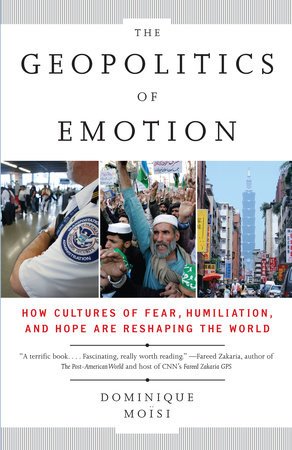The Geopolitics of Emotion
What does emotion have to do with geopolitics? Everything, according to Dominique Moïsi, author of The Geopolitics of Emotion: How Cultures of Fear, Humiliation, and Hope Are Reshaping the World (Anchor Doubleday). Moïsi, a French political scientist, Harvard professor, and son of an Auschwitz survivor, argues that we cannot understand the events of history without careful consideration of the role of emotions, “which seem to control us much more than we control them.” The world, he says, is characterized by three key emotions: fear, hope and humiliation.
The reason I have chosen these three emotions is that they are closely linked with the notion of confidence, which is the defining factor in how nations and people address the challenges they face as well as how they relate to one another. Fear is the absence of confidence. If your life is dominated by fear, you are apprehensive about the present and expect the future to become ever more dangerous. Hope, by contrast, is an expression of confidence; it is based on the conviction that today is better than yesterday and that tomorrow will be better than today. And humiliation is the injured confidence of those who have lost hope in the future; your lack of hope is the fault of others, who have treated you badly in the past. When the contrast between your idealized and glorious past and your frustrating present is too great, humiliation prevails.
Moïsi argues that today, Asia is the region of hope, the Middle East is the region of humiliation, and the West (Europe and the United States) is the region of fear. The book reminds me of The Post-American World by Fareed Zakaria, which basically says that the world has changed and while that fact is unsettling for the West, it’s not all bad news, especially if we can learn from Asia’s successes. Here, Moïsi paints for the most part in broad strokes, akin to Thomas Friedman’s sweeping assertion that the world is flat.
These generalizations are true as far as they go, but they both have their fair share of exceptions, and Moïsi concedes as much. While Asia is the region of hope, this isn’t particularly true in Japan, with its aging population being a deciding factor. While humiliation sets the tone in the Middle East, the emirates are for the most part exempt, enjoying relative prosperity and stability, at least for now. And while the West is largely gripped by fear these days (largely in response to Asia’s hope and the Middle East’s humiliation), the United States has always had an underlying sense of hope, and it surfaces here and there even still.
To his credit, he also includes a chapter on the countries — Russia, Israel, and possibly Iran — and entire regions — Africa and Latin America — that don’t fit into his sweeping generalizations. He explains these exclusions:
In the beginning of the twenty-first century, the jury is still out on Africa and Latin America. Policy makers, businesspeople, and those concerned with human development cannot ignore these two continents. But they are not, not yet, the places where the future of the world is being decided, nor will they become so in the foreseeable future.
It seems a bit short-sighted to simply exclude from a book on geopolitics two huge continents with a combined 1.6 billion people* in 80 countries**. Also, though the book was published relatively recently (in May 2009), parts of it are noticeably outdated, particularly considering the events that have swept the Middle East over the past year or so. Would Moïsi still consider the Middle East to be a region of humiliation, or would it now be better characterized as one of hope? I’m not sure.
But all in all, I can’t fault Moïsi too much for these shortcomings. The so-called Arab Spring caught just about all of us by surprise, and despite my own biases, maybe he’s right that at least for now Africa and Latin America aren’t going to decide the future for the rest of the world. He is right that emotions certainly do shape how we live our lives, and reflecting on broader emotional patterns at the geopolitical level may help us better understand the complicated world in which we live.
How does Moïsi’s argument sit with you, that the world is characterized by fear, humiliation, and hope? What significant exceptions do you see? How might a better understanding of the role emotions play in shaping our world help us in our pursuit of the common good? And while I’m at it, what role do you see the rapidly growing church in Africa, Asia and Latin America playing in the reshaping of our world?
Notes:
* Based on populations of 572,039,894 in Latin America [source] and 1,022,234,000 in Africa [source].
** 56 countries and territories in Africa [source] and 24 in Latin America [source].
